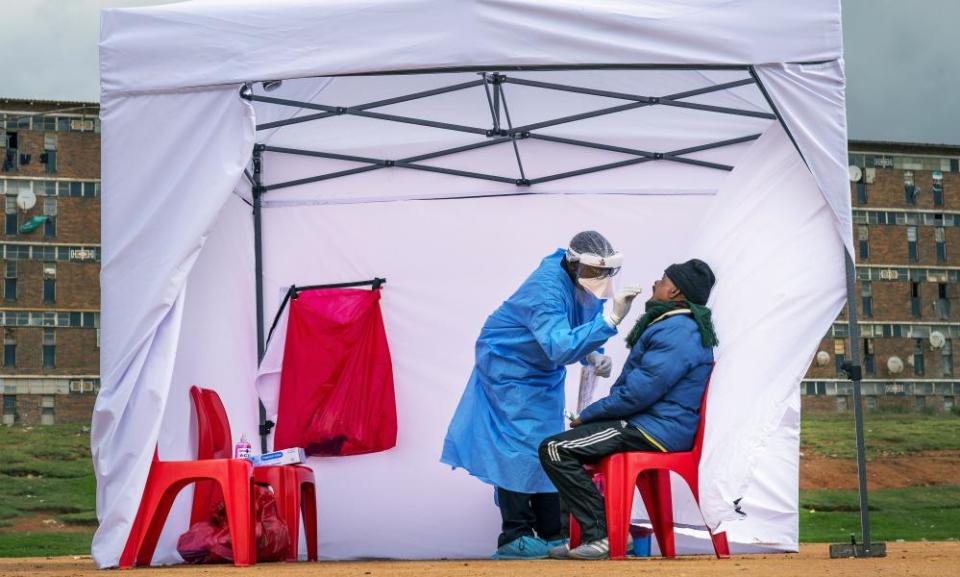At Davos, the global elite should ensure the whole world can access Covid vaccines

In different times, the president of South Africa would have been one of the world leaders in Switzerland this week for the annual gathering of the global elite in Davos. But the January talkfest has been online-only, and covered less avidly than usual by the media.
That’s a pity in Cyril Ramaphosa’s case because of what he had to say about the dangers of “vaccine nationalism”: that while the leaders of the world’s richest countries keep insisting that Covid-19 is a global virus that respects no borders, they are simultaneously hogging vaccines for their own use.
What’s more, they have failed to take the steps that would give poorer countries a better chance of coping with the pandemic. A report by the Economist Intelligence Unit showed that, though people in western countries can expect to be vaccinated during 2021, many of the world’s poorest nations will not have access to Covid-19 medicines until 2023 at the earliest.
That’s a scary prospect. Africa escaped the worst of the first wave of the pandemic last year, but the second wave is spreading fast across the continent and health systems are in danger of collapsing.
In a sense, Ramaphosa was too polite: this is not vaccine nationalism. It is – as the development economist Jayati Ghosh notes – vaccine apartheid. And the implications are obvious: much less chance of global herd immunity; much greater chance of genetic mutations; and much more stringent border controls, and for longer, in the attempt to prevent reinfection.
There is also a geopolitical dimension. If western democracies choose to turn their backs on poorer countries, they shouldn’t be surprised if Russia and China export their vaccines as a way of advancing their own interests. Xi Jinping said in his speech to the online Davos that Beijing would help countries and regions less prepared to cope with the pandemic, and make sure Covid vaccines were available and affordable for developing countries. While western countries are preoccupied with their own immediate domestic problems, China is playing a long game.
It should not be all that difficult to come up with a package of measures that would help. Richer countries that have cut aid budgets (such as Britain), or are contemplating doing so, should think again. The UK is on course to borrow £400bn this year and the £3-4bn the Treasury is saving by trimming development assistance is a false economy.
There needs to be urgent action to head off a debt crisis that was in the offing even before the pandemic arrived. Some limited debt relief has been agreed by the G20 group of nations – but it is not enough, in part because private sector lenders are not included. Poor countries are still spending £67m a day on debt payments, money that could be spent on public health. The Jubilee Debt Campaign notes that most debt contracts are governed by English law, and the UK government should provide new legal protections to prevent poor countries being sued by private lenders who refuse to offer debt relief.
In addition, the firepower of the International Monetary Fund (IMF) and the World Bank needs to be increased so they can step up their financial support. Developed countries have been able to flood their economies with cash through the money creation process known as quantitative easing, and the IMF could do something similar for poorer nations by issuing special drawing rights, which boost the foreign currency reserves of all member states.
Even with more generous aid, debt relief and beefed-up support from the IMF and World Bank, it will be a stretch for poorer countries to afford patented vaccines, but they are prevented from producing cheaper generic alternatives by ferociously guarded intellectual property rules. Pharmaceutical companies say these are needed because the cost of developing vaccines is so high, but large slugs of public money are also involved in these endeavours. So, if rich countries are really serious about collectively tackling the pandemic, they should suspend intellectual property rights on therapeutic and preventive treatments for Covid-19.
Ghosh says this is low-hanging fruit that could easily be picked, and she is right. Debt relief is possible. A better global financial system is possible. Compulsory licensing for lifesaving drugs is possible. Closing tax havens and making sure billionaires pay their fair share of tax is possible.
It all comes down to political will. But one thing is for sure: unless some political will is shown, the global fight against Covid-19 will be a long-drawn out affair. A convoy’s progress depends on all its ships moving together.
Larry Elliott is the Guardian’s economics editor

 Yahoo Finance
Yahoo Finance 